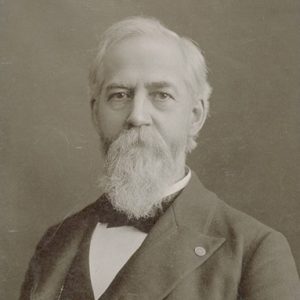calsfoundation@cals.org
William Perkins Black (1842–1916)
A Medal of Honor recipient for valor during the Battle of Pea Ridge, William Perkins Black later served as an attorney and gained national prominence as lead counsel for the legal team that defended the accused bombers in Chicago’s Haymarket Square Riot case.
Born on November 11, 1842, in Woodford County, Kentucky, to the Reverend John Black and Josephine Culbertson Black, William Black was the second son of their four children. After Rev. Black died in 1847, Josephine Black moved her family to Danville, Illinois, to be near her brother James Culbertson. Soon thereafter, she married Dr. William Fithian. Fithian served in the Illinois state legislature with Abraham Lincoln in 1834, and Lincoln successfully represented Fithian in a lawsuit in 1850. During the 1858 senatorial campaign, Lincoln stayed at the family’s Danville home during his travels for the Lincoln-Douglas debates and spoke briefly to a crowd of well-wishers on September 21.
At the outbreak of the Civil War, Black was enrolled as a ministry student at Wabash College in Crawfordsville, Indiana. Along with his brother John Charles Black, William Black initially served a three-month enlistment with the Eleventh Indiana Infantry and fought in the Battle of Romney, West Virginia, on June 11, 1861. Soon thereafter, Black joined Company K of the Thirty-Seventh Illinois Infantry as first lieutenant. Regimental elections soon elevated his brother to major and William Black to the rank of captain, commanding Company K.
William Black earned a Medal of Honor at the Battle of Pea Ridge on March 7, 1862, when he single-handedly checked the enemy’s advance against his company’s position and prevented the capture of Battery A of the Second Illinois Light Artillery. Black suffered a severe wound to his left side during this action. As with many Medals of Honor awarded for actions performed during the Civil War, Black’s medal was awarded more than thirty years after the cited action. Black received his medal on October 2, 1893. His brother John Charles Black received the Medal of Honor on October 31, 1893, making them the first of five pairs of brothers to both receive the Medal of Honor for Civil War service. Black also participated in the capture of Arkansas Post, the Vicksburg campaign, and the Red River campaign. He received an honorable discharge on September 29, 1864, and returned to Danville.
After the war, Black moved to Chicago, Illinois, and studied law at the firm of Arrington and Dent. He passed the Illinois bar exam in 1867 and established a successful corporate law practice with Thomas Dent, with clientele that included the Chicago Board of Trade.
William Black married Hortensia Mary MacGreal of Galveston, Texas, on May 28, 1869, and they had a son named William Paul Elisha Black.
In 1886, Black agreed to lead a defense team for the Haymarket Square Riot conspirators. Black’s co-counselors included William Foster, Moses Salomon, and the radical attorney Sigmund Zeisler. In 1887, Black also led an unsuccessful appeal to the Supreme Court of Illinois and the U.S. Supreme Court, with former Major General Benjamin F. Butler and former Confederate veterans John Randolph Tucker and Brigadier General Roger Atkinson Pryor as co-counsels. On November 13, 1887, Black delivered a compassionate eulogy at the funeral of the executed defendants. Zeisler characterized Black’s association with the controversial case as “nothing short of an act of heroism,” which exacted at least a short-term toll on his career. Inspired by a desire to uphold the ideals of the legal principle of due process rather than sympathy with the anarchist politics of the defendants, Black’s work on the case (and his belief that the proceedings represented a miscarriage of justice) brought about the dissolution of his partnership with Dent. Afterward, Black established the firm of Black and Fitzgerald and also practiced independently.
Originally a Republican, Black changed political allegiance in 1872 in favor of the candidacy of Horace Greeley. He ran unsuccessfully for the U.S. Congress on the 1882 Democratic ticket. Black was also a longtime member of the Grand Army of the Republic.
Black’s wife died in 1910. Black died on January 3, 1916, and is buried in Graceland Cemetery in Chicago, Illinois.
For additional information:
Banasik, Michael E., ed. Duty, Honor, and Country: The Civil War Experiences of Captain William P. Black, Thirty-seventh Illinois Infantry. Iowa City, IA: Press of the Camp Pope Bookshop, 2006.
Beyer, W. F., and O. F. Keydel. Deeds of Valor: How America’s Civil War Heroes Won the Congressional Medal of Honor. New York: Smithmark Publishers, 2000.
James Green. Death in the Haymarket: A Story of Chicago, the First Labor Movement and the Bombing that Divided Gilded Age America. New York: Pantheon Books, 2006.
Medal of Honor Historical Society of the United States. http://www.mohhsus.com/medal-of-honor (accessed: October 25, 2017).
Shea, William L. Fields of Blood: The Prairie Grove Campaign. Chapel Hill: University of North Carolina Press, 2009.
Shea, William L., and Earl J. Hess. Pea Ridge: Civil War Campaign in the West. Chapel Hill: University of North Carolina Press, 1992.
United States Army Center of Military History. http://www.history.army.mil/moh/index.html (accessed: October 25, 2017).
Wilder, Jeremy H. “The Thirty-Seventh Illinois at Prairie Grove.” Arkansas Historical Quarterly 71 (Summer 2012): 164–180.
Robert Patrick Bender
Eastern New Mexico University–Roswell
 Civil War through Reconstruction, 1861 through 1874
Civil War through Reconstruction, 1861 through 1874 Law
Law Military
Military William Perkins Black
William Perkins Black 



Comments
No comments on this entry yet.